#patent drugs
Explore tagged Tumblr posts
Text
7 Pharmakeia, Pharmakon, and Pharmakoi Verses In Bible
“The Sackler family, one of the richest in the country, has made their fortune on sales of the prescription pain killer OxyContin. The drug was introduced in the mid-1990s and since that time, there have been 200,000 deaths in the U.S from prescription opioids. https://dianerehm.org/shows/2019-04-12/the-family-that-profited-from-prescription-opioids Six doctors charged in 500 million opioid…
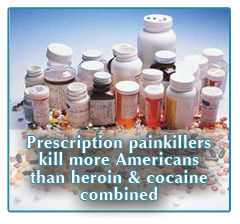
View On WordPress
#Big Pharma#idolaters#liars#magic spells#mammon#murderers#negative side effects#pain relieving drugs#patent drugs#pharmakeia#pharmakoi#pharmakon
0 notes
Text
Uncle Sam paid to develop a cancer drug and now one guy will get to charge whatever he wants for it

Today (Oct 19), I'm in Charleston, WV to give the 41st annual McCreight Lecture in the Humanities. Tomorrow (Oct 20), I'm at Charleston's Taylor Books from 12h-14h.

The argument for pharma patents: making new medicines is expensive, and medicines are how we save ourselves from cancer and other diseases. Therefore, we will award government-backed monopolies – patents – to pharma companies so they will have an incentive to invest their shareholders' capital in research.
There's plenty wrong with this argument. For one thing, pharma companies use their monopoly winnings to sell drugs, not invent drugs. For every dollar pharma spends on research, it spends three dollars on marketing:
https://www.bu.edu/sph/files/2015/05/Pharmaceutical-Marketing-and-Research-Spending-APHA-21-Oct-01.pdf
And that "R&D" isn't what you're thinking of, either. Most R&D spending goes to "evergreening" – coming up with minor variations on existing drugs in a bid to extend those patents for years or decades:
https://www.ncbi.nlm.nih.gov/pmc/articles/PMC3680578/
Evergreening got a lot of attention recently when John Green rained down righteous fire upon Johnson & Johnson for their sneaky tricks to prevent poor people from accessing affordable TB meds, prompting this excellent explainer from the Arm and A Leg Podcast:
https://armandalegshow.com/episode/john-green-part-1/
Another thing those monopoly profits are useful for: "pay for delay," where pharma companies bribe generic manufacturers not to make cheap versions of drugs whose patents have expired. Sure, it's illegal, but that doesn't stop 'em:
https://www.ftc.gov/news-events/topics/competition-enforcement/pay-delay
But it's their money, right? If they want to spend it on bribes or evergreening or marketing, at least some of that money is going into drugs that'll keep you and the people you love from enduring unimaginable pain or dying slowly and hard. Surely that warrants a patent.
Let's say it does. But what about when a pharma company gets a patent on a life-saving drug that the public paid to develop, test and refine? Publicly funded work is presumptively in the public domain, from NASA R&D to the photos that park rangers shoot of our national parks. The public pays to produce this work, so it should belong to the public, right?
That was the deal – until Congress passed the Bayh-Dole Act in 1980. Under Bayh-Dole, government-funded inventions are given away – to for-profit corporations, who get to charge us whatever they want to access the things we paid to make. The basis for this is a racist hoax called "The Tragedy Of the Commons," written by the eugenicist white supremacist Garrett Hardin and published by Science in 1968:
https://memex.craphound.com/2019/10/01/the-tragedy-of-the-commons-how-ecofascism-was-smuggled-into-mainstream-thought/
Hardin invented an imaginary history in which "commons" – things owned and shared by a community – are inevitably overrun by selfish assholes, a fact that prompts nice people to also overrun these commons, so as to get some value out of them before they are gobbled up by people who read Garrett Hardin essays.
Hardin asserted this as a historical fact, but he cited no instances in which it happened. But when the Nobel-winning Elinor Ostrom actually went and looked at how commons are managed, she found that they are robust and stable over long time periods, and are a supremely efficient way of managing resources:
https://pluralistic.net/2023/05/04/analytical-democratic-theory/#epistocratic-delusions
The reason Hardin invented an imaginary history of tragic commons was to justify enclosure: moving things that the public owned and used freely into private ownership. Or, to put it more bluntly, Hardin invented a pseudoscientific justification for giving away parks, roads and schools to rich people and letting them charge us to use them.
To arrive at this fantasy, Hardin deployed one of the most important analytical tools of modern economics: introspection. As Ely Devons put it: "If economists wished to study the horse, they wouldn’t go and look at horses. They’d sit in their studies and say to themselves, ‘What would I do if I were a horse?’"
https://pluralistic.net/2022/10/27/economism/#what-would-i-do-if-i-were-a-horse
Hardin's hoax swept from the fringes to the center and became received wisdom – so much so that by 1980, Senators Birch Bayh and Bob Dole were able to pass a law that gave away publicly funded medicine to private firms, because otherwise these inventions would be "overgrazed" by greedy people, denying the public access to livesaving drugs.
On September 21, the NIH quietly published an announcement of one of these pharmaceutical transfers, buried in a list of 31 patent assignments in the Federal Register:
https://public-inspection.federalregister.gov/2023-20487.pdf
The transfer in question is a patent for using T-cell receptors (TCRs) to treat solid tumors from HPV, one of the only patents for treating solid tumors with TCRs. The beneficiary of this transfer is Scarlet TCR, a Delaware company with no website or SEC filings and ownership shrouded in mystery:
https://www.bizapedia.com/de/scarlet-tcr-inc.html
One person who pays attention to this sort of thing is James Love, co-founder of Knowledge Ecology International, a nonprofit that has worked for decades for access to medicines. Love sleuthed out at least one person behind Scarlet TCR: Christian Hinrichs, a researcher at Rutgers who used to work at the NIH's National Cancer Institute:
https://www.nih.gov/research-training/lasker-clinical-research-scholars/tenured-former-scholars
Love presumes Hinrichs is the owner of Scarlet TCR, but neither the NIH nor Scarlet TCR nor Hinrichs will confirm it. Hinrichs was one of the publicly-funded researchers who worked on the new TCR therapy, for which he received a salary.
This new drug was paid for out of the public purse. The basic R&D – salaries for Hinrichs and his collaborators, as well as funding for their facilities – came out of NIH grants. So did the funding for the initial Phase I trial, and the ongoing large Phase II trial.
As David Dayen writes in The American Prospect, the proposed patent transfer will make Hinrichs a very wealthy man (Love calls it "generational wealth"):
https://prospect.org/health/2023-10-18-nih-how-to-become-billionaire-program/
This wealth will come by charging us – the public – to access a drug that we paid to produce. The public took all the risks to develop this drug, and Hinrichs stands to become a billionaire by reaping the rewards – rewards that will come by extracting fortunes from terrified people who don't want to die from tumors that are eating them alive.
The transfer of this patent is indefensible. The government isn't even waiting until the Phase II trials are complete to hand over our commonly owned science.
But there's still time. The NIH is about to get a new director, Monica Bertagnolli – Hinrichs's former boss – who will need to go before the Senate Health, Education, Labor and Pensions Committee for confirmation. Love is hoping that the confirmation hearing will present an opportunity to question Bertagnolli about the transfer – specifically, why the drug isn't being nonexclusively licensed to lots of drug companies who will have to compete to sell the cheapest possible version.

If you'd like an essay-formatted version of this post to read or share, here's a link to it on pluralistic.net, my surveillance-free, ad-free, tracker-free blog:
https://pluralistic.net/2023/10/19/solid-tumors/#t-cell-receptors

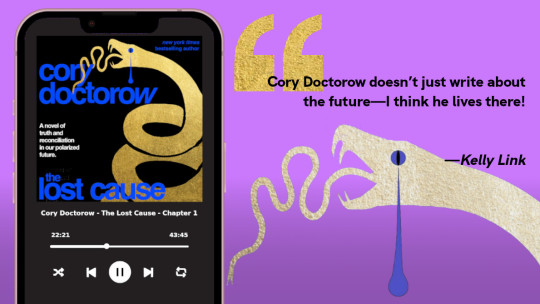
My next novel is The Lost Cause, a hopeful novel of the climate emergency. Amazon won't sell the audiobook, so I made my own and I'm pre-selling it on Kickstarter!
#pluralistic#pharma#incentives dont matter#incentives matter#drugs#uspto#nih#national institutes of health#cancer#patents#kei#knowledge ecology international#james love#jamie love#bayh-dole#bayh-dole act#tcr#scarlet tcr#t-cell receptor#Christian Hinrichs#entrepreneurial state#human papillomavirus#hpv#solid tumors#monopolies
552 notes
·
View notes
Note
Wanted to send an ask as well to hopefully provide some distraction from…recent events.
Are there any parts of world building in the TF IDW universe that you wish were explored/expanded upon more? Or that you want to explore in your writing? Like certain aspects of pre-war Cybertron, cybertronian culture, post-war Cybertron, etc?
Okay this is actually perfectly timed for a rant I wanted to go on about the way mnemosurgery is written in IDW1 because I hate how JRO basically made it an ontologically evil field of medicine both intrinsically and in terms of the average person who does it, like
First of all I want to preface this by saying I'm not accusing JRO of having any particular beliefs, this is just my commentary on how things came off and how his writing style contributes to both virtues and flaws in his writing. So I might say "he's basically saying this" but in the sense of "unfortunate implications, accidental or purposeful, in his writing."
But like... it makes me so mad because the worldbuilding around mnemosurgery kind of makes no sense to me? It seems like a really fucking wasted opportunity to cast basically every mnemosurgeon in the continuity as evil and to make it so that even just doing mnemosurgery is basically a toxic, destructive act that will literally kill you? Honestly, I don't think JRO even came up with mnemosurgery as like, "here's a thing that exists in this world and how it works" so much as, he took a character-first approach to writing (as he always does) and wrote mnemosurgery to work whatever way would work best for Chromedome and other character-related conflicts and plot points.
Like, mnemosurgery can view/alter memories from a living person but from a dead person it can only get moments from right before death. Makes sense. Mnemosurgery slowly kills you every time you do it??? Uh... honestly that comes off more as a handwave to make it so that any time the LL needs information they can't just needle it straight out of whoever's mind they need bc of course Chromedome can only do it when it's really important after all. Mnemosurgery... is only ever used for brainwashing people? Like, literally every mnemosurgeon except Chromedome is evil (and cartoonishly so, for Trepan and Sunder, like literally unredeemable monsters in every way) and any time they actually enjoy their field of medicine it's bc they're a sadist that likes to manipulate and oppress people? Kind of... uncreative.
Mnemosurgery is ADDICTIVE?? You're addicted to needling people's brains because mnemosurgery is ontologically evil and then it literally kills you? Okay like... do I even need to explain how tone-deaf it is to incorporate addiction of all things into the worldbuilding here? "You're an addict which makes you dangerous to society. The good ones stop doing the addictive thing because they're morally strong/care about others/aren't hedonists, but the bad ones who only care about doing their drug of choice are evil because the fact that they don't quit shows that they don't care about other people and OF COURSE the main/only fate that awaits addicts is their inevitable death by their own addiction!" Like, we get enough of that shit in real life, JRO. Did you really have to take an already heavily stigmatized condition like ADDICTION and slap it onto your ontologically evil mnemosurgery where the evil ones are evil because they love abusing/manipulating people and don't care enough about dying to stop being addicted to mnemosurgery? Come the fuck on.
Like, I understand that "the science of studying/altering memories" is heavily laden with nightmare fuel as is, and I don't have a problem with that (and stuff like the Institute) because the mind/memories are an intrinsic part of personhood, so any scientific field around it (or any government that wants to sponsor it) will abuse that knowledge just like with any other field of medicine. But to use human examples, why the fuck does mnemosurgery have to be inherently evil? What about stuff like Alzheimer's that degrades ppl's memories to the point of not even remembering a few seconds ago? Wouldn't it be beautiful if mnemosurgery could help with that? What about psychological issues where maybe people with intense PTSD/trauma/etc could have their worst memories be removed/dulled so that they become mentally stable enough for psychiatric/therapeutic interventions to become effective? What if someone has a TBI and wants help recovering the memories they lost?
What about non-scary, non-medicinal applications of mnemosurgery? What if someone just really treasures the memory of a particular day with their best friend and visits a mnemosurgery every couple years so that information creep doesn't slowly alter their memories of that precious day? What if it was possible for mnemosurgeons to intensify memories, so that maybe someone could have a happy memory intensified and think of it any time they're sad, struggling, having mental health struggles, etc? What if mnemosurgeons could take/copy memories from people's brains and convert them to video format in a way that other people could watch it? Imagine the sheer potential present in that when it comes to preserving history through literal firsthand testimonials of what happened! What if a mnemosurgeon could transfer memories from one person to another-- what kinds of breakthroughs in empathy, communication, and understanding others could happen if you could LITERALLY see a conflict from another person's perspective? In those ways, mnemosurgeons would basically be able to act as a hybrid of doctor, psychologist, diplomat, mediator, and archivist all in one!
But no... instead we just got "Mnemosurgery is evil and pretty much only used for brainwashing, 99.8% of all mnemosurgeons are evil creeps, oh by the way it's also addicting and will literally kill you if you do it too much." SMFH.
#squiggle answers#meta#idk if my contempt for the addiction part comes off strongly enough. like#as it is addiction is already spun as a moral failing by ppl who only care about getting high and not about hurting themselves/others#so like. why would you take addiction and apply it as an element of worldbuilding where indulging that addiction literally makes you evil#(or rather where the only ppl who continuously indulge their addiction are evil and just like doing it)#you wanna know something? IRL more addicts get sober than die of overdoses. ODing and being addicted forever is THE MINORITY#BEING AN ADDICT DOESN'T DOOM YOU TO DYING BY YOUR OWN SUPPOSED VICES AND LACK OF SELF CONTROL#getting clean is THE NORM and not the exception! so why in the hell would you write it into your fictional story#and make it so that not only are most of these addicts evil people but they'll also all inevitably die bc of their addiction???#this sort of worldbuilding literally propagates the idea that addicts are doomed to die in the majority of cases (patently untrue)#and like frames the ppl who are addicted as basically being evil and choosing to continue needling people#that's not how real life addiction works. like at all. irl addicts don't destroy their health w drugs bc they love doing it#but yeah in general JRO kind of has this issue with black and white morality. you see it pop up everywhere in his writing#his depiction of mnemosurgery comes off as one of those trademark JRO#'here is your sign that this character is evil and unredeemable bc they do this thing that's inherently evil'#kind of things. and as someone recently getting into studying addiction as a social issue it sucks ass
17 notes
·
View notes
Text
hello.
I have returned from the trenches of Twitter to inform yall that there is an effort to mobilize against Johnson & Johnson's decision to extend their patent on a life-saving tuberculosis drug. Renewing this patent will prevent millions of people from accessing life-saving care.
If you would like to learn more, watch this video:
youtube
If you would like to do something, you can make memes, @ J&J on social media, and report your concerns here:
https://secure.ethicspoint.com/domain/media/en/gui/28704/report.html
#john green#hank green#tuberculosis#johnson & johnson#johnson and johnson#j&j#TB#twitter#vlogbrothers#dftba#nerdfighters#nerdfighteria#bedaquiline#big pharma#scishow#crashcourse#the green brothers#youtube#drug patents#us news#not atla
64 notes
·
View notes
Text
IF?
The government will give the public 60 days to comment on the new proposal before attempting to finalize it.
^^^ COMMENT vvv
#capitalism#healthcare is a human right#drug lobby#big pharma#drug manufacturers#economics#healthcare#public health#medicine#health care#patents#us politics
8 notes
·
View notes
Text
Rough on Rats: (Un)Truth In Advertising
Ever wondered how ‘snake oil’ came to epitomize quack medicine? Or who the first snake oil salesman was? (Well, thanks to a great book called Quackery and some research, I can tell you.) During the 1893 World’s Fair in Chicago, a man named Clark Stanley took to one of the Fair’s many stages. Dressed in the height of frontier fashion, he produced a rattlesnake from a bag and then proceeded to slit…

View On WordPress
#1906 pure food and drug act#arsenic#clark stanley#e.s. wells#Ephraim wells#murder#my 52 weeks with christie#mystery#patent medicines#poisoning#rough on rats#snake oil#snake oil Liniment
5 notes
·
View notes
Text
Global genocide, what a beautiful choice...
In case you missed it - and a golf update seems to have knocked it off the front page - Republicans are threatening to kill millions of people in order to protect "the unborn child." No, not just pregnant women like usual, but men and children - everyone.
The US has been giving HIV/AIDS meds to people who can't afford them, internationally, for about two decades. Most of the institutions distributing these meds are Catholic. Catholics are infamously anti-abortion - to the point of allowing mothers to suffer and die, just like Republicans! This program has a requirement to spend money teaching abstinence - it was penned into law by G. W. Bush! It seems like there shouldn't be a conflict of interest between these two groups, but there is now, and there's a clock ticking down to when these people won't get the meds they need to stay alive.
I suspect our old friend "intellectual property" also has a hand in this situation. It doesn't look like we've spent any money over the last two decades on building infrastructure so these places can make their own damn meds, we just buy them premade and ship them. Actually helping these places manufacture these very expensive drugs would eat into the profits of the pharmaceutical companies that "own" them. It's much better for Gilead there if people just buy drugs and send them. We can just keep doing that forever, right? It's good PR!
Well, now we're in a position where a grandstanding, megalomaniacal political party can hold millions of orphaned children hostage while crowing that they're "saving babies". The Republican solution is that these foreigners should be "responsible" and pay for their own meds... while US companies sit on the patents and jack up the damn prices as high as the market will bear. Yeah, that'll work great.
I've already fled the States. If Democrats can't stop this from happening... You... You can't expect me to keep filling out a ballot and giving you a fig leaf of legitimacy. I found out this year that you didn't even stop stealing children at the border. You can't ask me to keep behaving like it's going to be fine and the system can heal itself if I just keep participating in it. I don't want anything to do with this. I am being dragged kicking and screaming to check a box for people who throw up their hands and refuse to help because, I dunno, maybe this time they might? And then they try to tell me this is my fault, for not being centrist enough.
I dunno what I'm gonna do. I mean, distract myself. Keep redistributing wealth by fair means and foul. And keep yelling about these things. But apart from that...?
#us politics#global politics#abortion#hiv#aids#republicans#democrats#drug patents#price gouging#capitalism#imperialism#just bad shit all around#i don't want to live on this planet anymore
6 notes
·
View notes
Text
isnt infringing on individual sovereignty wrong?
esp if that person is not physically harming another with their actions?
i can hear the stupid arguments now.
but someone smoking weed or being queer is not physically harming anyone.
besides: if mf can run around with guns to protect their body, why cant i run around with weed to protect my body and mind??
#cannabis#marijuana#legalize#gun control#2nd amendment#second amendment#sovereignty#self determination#america#our democracy is very fucked up#needs a update into something better#that acknowledges the bigotry/greed that has poisoned true freedom in this country#mf laws against living sustainably#not to mention patents on tech that could change the world#conspiracy#drugs#vote blue
10 notes
·
View notes
Text
I was writing this in the tags but I want to include sources. I’m gonna tell you why drugs don’t go generic right away, and I want you to know that I don’t agree with the reasoning here, but this is how the system works.
New drugs are priced so much to recoup some of the losses of research. Drug research is insanely expensive. Whether you’re talking about buffers and reagents in the lab, machines designed to give scientists highly specific information, or required animal research, it’s EXPENSIVE. I tried to pull up an example for a standard microscope but companies that make lab equipment don’t have prices on their website, you have to fill out a form to request a quote.
So, lab equipment is expensive. You also have to go through rounds of animal testing. One lab mouse can cost hundreds of dollars, depending on how it has been genetically designed to give the best research results. And spoiler alert, you need repeat results, meaning multiple mice, and then larger lab animals because humans aren’t mice and we need to be sure drugs are safe before testing them on humans. Raising and caring for lab animals also takes lots of highly trained staff, which adds to the expense. This is partially why a lot of scientists in animal research are pushing for alternative research methods, because it is more humane and more cost effective to reduce our reliance on animal models.
So it’s expensive to do research, and then you get into patent law. Drugs get 20 years of patents, although that’s from when the patent was filed - which is often BEFORE the drug hits the market. You can patent a drug and then still have several more years of development. So in practice, drugs are often on the market for less than their patent time. From the drug company’s perspective, they need to recoup their losses in that amount of time, and the high price of the name brand drug is funding the ongoing research of the next drug.
Generic drugs don’t have to go through animal or clinical trials, so companies making generic drugs ONLY have to consider the manufacturing cost when pricing their drugs. This is why they’re so much cheaper, because all they have to prove is that their drug is the same as the patented one.
Lenacapavir is STILL IN CLINICAL TRIALS, according to the source linked above. It hasn’t been approved for prevention. I believe it will probably be approved, but the point is that it’s a very new drug and still within its patent range. I’m not entirely sure when the patent was filed, but the fact is that it will have a generic eventually. Just not right now. But the reasoning for drugs being so expensive is that they’re factoring in the cost of research, not just the cost of production. I don’t like it! It’s a bad system! But that’s why it is the way it is
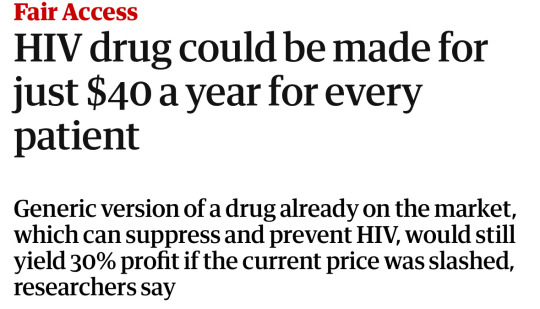


Source
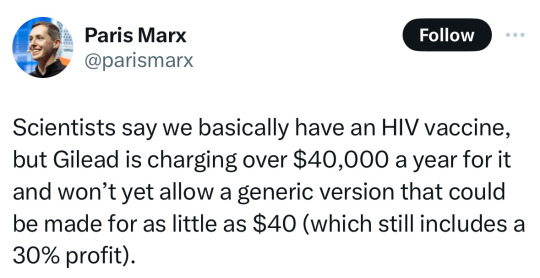
#I am having trouble finding sources but there’s more complications as well#bc the companies can use their research that they did in the US to support approval in other countries#there are places that just do a lit review and approve drugs if the FDA approved them#but then mandate lower costs#which means that US consumers end up paying more to support the lower prices of other countries#bc we have less regulatory protection#and you have to factor in the way insurance inflates costs bc you have to go through them#I doooont remember which book I read this in though so please question my summary in these tags#like continue being angry at pharma companies because there’s no reason for things like insulin to be expensive#but every once in a while I see things like this where people are like new miracle drug but no generic!!! evil!!!#and I’m like THATS HOW PATENT LAW WORKS#YOU DONT GET TO HAVE A GENERIC WHILE THERE IS AN ACTIVE PATENT#like the real solution would be to abolish capitalism but until we get there#you have to pay the salaries of people who breed mice and manufacture microscopes and maintain microscopes for the scientists to use them#and all of that builds up to expensive drug prices#now if the company would reinvest ALL of that profit into new research I’d be much more okay with higher prices#it’s a taxing the rich problem more than it is a generic vs patent problem
38K notes
·
View notes
Text
I know it's useful to consume perspectives that make me feel defensive and self-conscious but I wish it was easier to tell when that feeling is coming from unexplored reactionary tendencies or whatever and when it's because I have a fair criticism that I just don't know how to articulate yet.
#I have such a knee-jerk reaction to criticisms of science as a concept or an industry idk#and most scientists imo aren't super interested in talking about the role of science in colonialism or flaws in the pharma industry#but I also feel like non-scientists don't Get It enough to know where to point the blame necessarily#spent a half hour the other day typing and retyping a response to someone on askamanager before just deleting it and walking away#because they said that in an ideally structured society R&D wouldn't be too expensive#and it's just. it takes SO much work and time and money to develop one single drug#and sure some of that cost is bloat from pharma and insurance companies#and from the vendors of scientific reagents overcharging because they know they can#but some corners can't be be cut#idk I think patent law for scientific/therapeutic tools needs massive reform and some things should legally have to be open-source#but science is going to cost money. there's a crisis in academia right now because the NIH won't raise the minimum postdoc salary#and that's not good for anyone#idk scientists should learn the sociology/history of our field (beyond responsible conduct of research classes mentioning nazi experiments)#and we need to learn to talk to non-scientists without being condescending#personal
1 note
·
View note
Photo
This is someone who once watched a TV show featuring their speciality and was Incredibly Disappointed

it was x reader fanfic…
#don't even ask me about orphan black and that patents#and that's not even MY speciality#though depictions of people on drugs is often incredibly what the fuck#like when MDMA turned Finch into an idiot#it doesn't work that way
1K notes
·
View notes
Text
Rough on Rats: From the Office of Cynical Speculation
Since using dangerous and/or addictive compounds in patent “medicines” was common and we know Ephraim had large quantities of arsenic on his hands, I wonder how many of his other products contained traces of this dangerous element. A number of the claims made in the ads for Wells’ beauty aids and “medicines” sound remarkably similar to the effects (the crazy people during the Victorian era)…
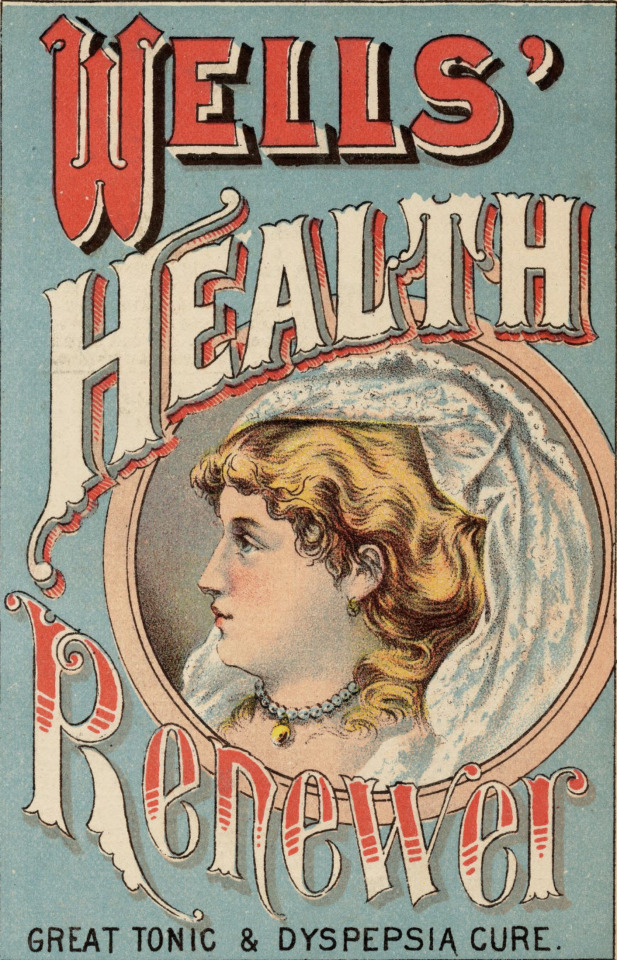
View On WordPress
#1906 pure food and drug act#e.s. wells#my 52 weeks with christie#mystery#patent medicine#rough on rats#Well&039;s hair basalm
4 notes
·
View notes
Text
Drug Patents and Drug Exclusivity
How long do drug patents last, and can you get them extended? Let's check it out!
If you've ever wondered why some drugs are more expensive than others and why you can only get certain drugs from specific pharmaceutical companies, then you're not alone.
Why are there more affordable generic versions of some drugs available but not all drugs?
Thanks to the FDA and its comprehensive guide on pharmaceutical patents, these are just some of the questions we will answer below in our drug patent FAQs.
Drug Patent FAQs Answered

A drug patent can be issued or expire at any time, regardless of the drug's current approval status. Exclusivity attaches to the drug upon approval of the drug or product as long as the statutory requirements have been met.
While some new drugs may have both patent and exclusivity protection, others may have one or the other or none at all. Exclusivity was created and designed as a way to promote a balance between new drug innovation and greater public access, which results from generic drug competition.
Developing new drugs can be not only time-consuming but also expensive. If generic versions of drugs were immediately allowed to hit the market, then drug companies wouldn't be able to recoup the financial costs associated with new drugs.
By granting limited patent and exclusivity periods, it creates a balance between promoting new drug development and giving patients better and more affordable access to generic drugs in the long term.

Drug patents are set in place by statute. The current term for a new drug patent is twenty years from the date the application was filed in the United States. There are a variety of other factors which may also affect the length of the patent.
There are extensions that pharmaceutical companies can apply for, which will enable them to recoup some of the lost time spent in the FDA approval process. This extension period covers up to five years, depending on the length of the approval proces
0 notes
Text
Early cyberpunk has this tension between framing a well-argued skepticism of body modification rooted in concerns about bodily autonomy and corporate ownership of human bodies, and being really shitty about actual disabled people because it was predominantly written by able-bodied folks who knew fuck-all about disability advocacy and treated all that bodily autonomy stuff as a metaphor for the artist's loss of intellectual freedom under the corporate state.
I look at folks on this site pulling the whole "well ACTUALLY having cool robot arms would suck because they'd be based on proprietary technology which would be used to exploit you, and then the owners would stop supporting it and you'd be left to slowly die" routine while clearly intending it purely as an ideological gotcha against cartoons they don't like and neither understanding nor caring that they're literally just describing the daily life of anyone whose chronic medical condition is managed by patented drugs, and I'm thinking "wow, forty years and we haven't learned a damn thing".
6K notes
·
View notes
Text
Texploration Profiles: Lantern Pharma
Innovating Cancer Treatment with Precision and Technology In the realm of biotechnology, where hope and science converge, stands Lantern Pharma, a beacon of innovation in the fight against cancer. Founded in 2013, this Dallas-based company is not just another biotech firm; it represents a pivotal shift in how we approach cancer treatment. Today, we delve into how Lantern Pharma is…

View On WordPress
0 notes
Note
Sorry I'm kind of dissociated and my vocab crashes during that can you explain the Biden drug thing in just. Shorter simple sentences.
Sure! You're not the only one who's mentioned being unclear on what it means either, and I'm happy to help
(Context for anyone else: US Sets Policy to Seize Patents of Government-Funded Drugs if Price Deemed Too High, via Good News Network, December 11, 2023)
From the very basics:
When drug companies create new drugs, they get a legal protection called a "patent." The patent means no one else can make or sell the same drug for whatever number of years.
Usually, this is about 10 years after the drug starts being sold to the public.
So, for those years, that one drug company is the only source of whatever medication. And since people need their medication, drug companies can charge however much money they want.
Meaning a lot of drugs that people need to live cost way too much money to buy.
So, with this, Biden told drug companies "Fuck you, if you keep making medicine too $$$ for people to afford, I'm giving your competition the right to make and sell those drugs too."
The US has never done anything like this before.
This is a huge threat to the whole (awful) drug industry in the US. It will save people thousands of dollars. If he does this, it will save lives.
--
Edit 12/17/23: Quick note, as people have said in the notes, this only applies to drugs made in part using taxpayer money. Which is! Literally all of them!
#Anonymous#prescription drugs#medicine#public health#biden#biden administration#united states#us politics#ask#me#good news#hope
13K notes
·
View notes